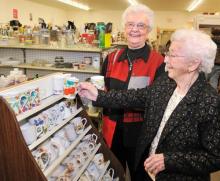Forty years ago, four women in the southern Manitoba community of Altona opened a thrift shop to raise funds for Mennonite Central Committee (MCC). It was the beginning of a network that has grown to 56 shops across Canada and 57 in the U.S. that have generated $167 million for the work of MCC.
“This is unbelievable,” exclaims Linie Friesen, 90, one of the founders of the Altona shop, which opened on March 17, 1972. “Our mustard seed has turned into a big tree and it is still growing,”
Friesen, who was a regular volunteer at the shop until a year ago, says the seemingly insignificant beginnings of MCC thrift shops and their steady growth remind her of how the blessings of God can turn small contributions into miraculous growth. “I think it has grown beyond our wildest dreams and hopes,” she says. “The Lord has blessed our efforts. It is just a remarkable thing.”
Reflecting on the early years, Friesen recalls her friend Selma Loewen, who had attended the MCC Manitoba annual meeting in February 1972. There, Loewen heard John Hostetler, then director of MCC’s material resources program, report that the ministry was reducing shipments of used clothing for overseas distribution.
Hostetler was also the one who made the now legendary statement: “What we need is a machine that will turn clothing into cash.”
Within a few days of the 1972 meeting, Loewen had invited Friesen and two other friends, Sara Stoesz and Susan Giesbrecht, to her home, where they discussed the idea of selling used goods locally and donating the proceeds to MCC. Friesen said that women’s groups contributed $125 to cover the first month’s rent of the shop, known back then as the Altona Community Self Help Centre. A month later, a thrift shop opened in Steinbach and later that year two shops opened in Winnipeg. These four shops contributed $6,300 to MCC in 1972.
Their remarkable success inspired people from Mennonite churches in other Manitoba communities to open thrift shops, and in 1974 thrift shops opened in Saskatchewan, Ontario and Ohio. In the early years, most shops were started and administered by women, but it didn’t take too long before men became involved in the shops, Friesen recalls.
Thrift shops not only generate funds for MCC; they are also an integral part of local communities, says Stoesz, 81, who still spends two hours almost every day sorting and pricing items. The many benefits of the shops include the availability of affordable goods, reusing and recycling items that would otherwise be thrown away, and meaningful opportunities for people to get to know each other and contribute to worthwhile causes.
“I have made a lot of friends here I didn’t know before,” says Stoesz. “It is very enriching to volunteer at an MCC thrift shop. It is fulfilling because it is helping others—at home and overseas.”
People donating items to MCC thrift shops, buying items or volunteering may feel their contributions are inconsequential. But Friesen emphasizes that the success of MCC shops demonstrates that collectively these efforts make a difference in local communities and around the world. Last year, the shops in Canada alone contributed $7.2 million to MCC.



Add new comment
Canadian Mennonite invites comments and encourages constructive discussion about our content. Actual full names (first and last) are required. Comments are moderated and may be edited. They will not appear online until approved and will be posted during business hours. Some comments may be reproduced in print.